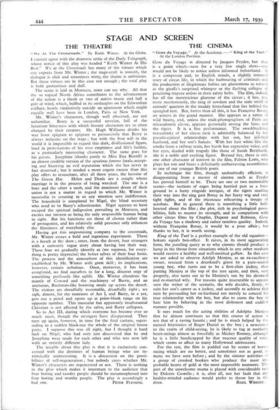THE CINEMA
"Gens du Voyage." At the Academy.—" King of the Turf." At the London Pavilion.
Gens du Voyage is directed by Jacques Feyder, but that is a point which—save for a very few single shots—one would not be likely to notice unless informed beforehand. It is a competent and, to English minds, a slightly immoral story of circus life, in which the harbouring of criminals and the production of illegitimate babies are phenomena as natural as the giraffe's surprised whimper or the flashing collapse of practising trapeze artists in their safety belts. The film, indeed, has all the meretricious glamour of the circus ; it has, too, more meritoriously, the tang of sawdust and the stale smell of animals' quarters in the muddy hinterland that lies behind the spangled tent. But, better than all this, it has Francoise Rosay, an actress in the grand manner. She appears as a tamer of wild beasts, and, unless the trick-photographers of Paris are miraculously clever, appears personally among the lions and the tigers. It is a fine performance. The swashbuckling masculinity of her circus turn is admirably balanced by her pseudo-cynical relationships with her son, her jail-bird husband, and her son's fiancée. With her hair white like the smoke from a railway train, her harsh but expressive voice, and her eyes, shaded with tragedy like those of Sarah Bernhardt, she is a noble and exciting figure. Beyond her, there is only one other character of interest in the film, Fabien Loris, who plays her son and bears a deliciously embarrassing resemblance to one of our younger British poets.
In technique the film, though undoubtedly efficient, is disappointing from a master of cinema such as Feyder has proved himself to be. There are one or two memorable scenes—the sections of cages being hurried past as a fore- ground to a hasty ringside intrigue, of the tigers snarling their way into the ring past Rosay in her fuzzy wig and very tight tights, and of the tricoteuse rehearsing a troupe of acrobats. But in general there is something a little half- hearted about the film ; the plot, rich in psychological possi- bilities, fails to muster its strength, and in comparison with other circus films by Chaplin, Dupont and Robison, Gens du Voyage has a shadowy and rather tasteless quality. Indeed, without Francoise Rosay, it would be a poor affair ; but thanks to her, it is worth seeing.
Ktng of the Turf is a perfect example of the old equation— hokum equals box-office. It raises, in its most aggravating form, the puzzling query as to why cinema should produce a lump in the throat from situations which in any other medium would receive a healthy and well-merited guffaw. In this case we are asked to observe Adolph Menjou, as an ex-racehorse owner, rescued from a drunkard's grave by a pure-souled young boy, who turns out to be a first-class jockey, thus putting Menjou at the top of the tree again, and then, very properly, also turns out to be Menjou's son by his divorced and re-married wife. For reasons quite inscrutable to anyone save the writer of the scenario, the wife decides, firstly, to ruin her son's career as a jockey, and secondly to achieve that ruin by persuading her ex-husband not merely to conceal his true relationship with the boy, but also to cause the boy to hate him by behaving in the most dishonest and caddish manner possible.
It says much for the acting abilities of Adolphe Menjou that he almost convinces us that this course of action is not that of a raving lunatic ; and he is much helped by the natural histrionics of Roger Daniel as the boy ; a newcomer to the realm of child-acting, he is likely to tug at motherly heart-strings almost as forcefully as Mickey Rooney, although he is a little handicapped by that raucous quality of voice which seems to affect so many Hollywood adolescents.
For the rest, the film is padded out by scenes of horse- racing which are no better, and sometimes not as good, as many we have seen before ; and by the sinister activities of a group of crooked bookies who produce the most im- probable hearts of gold at the most impossible moments. The part of the unwelcome mama is played with considerable tact by Dolores Costello ; it is, after all, not her fault that any healthy-minded audience would prefer to throw her in the










































 Previous page
Previous page